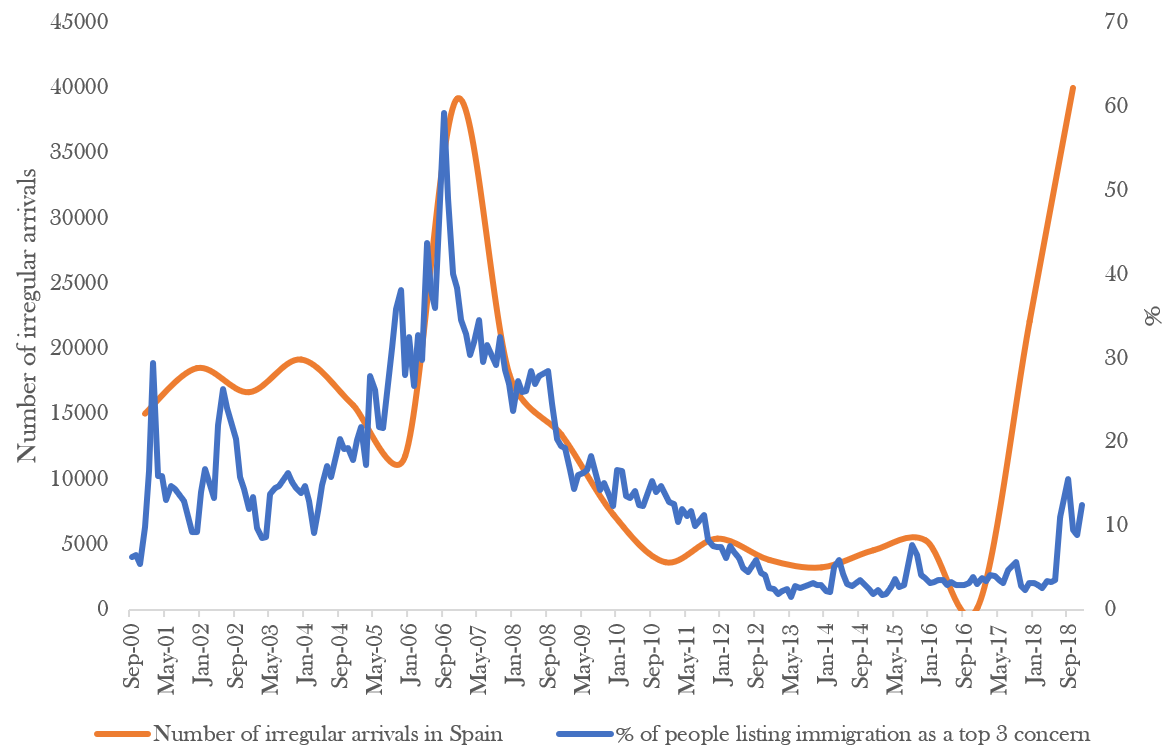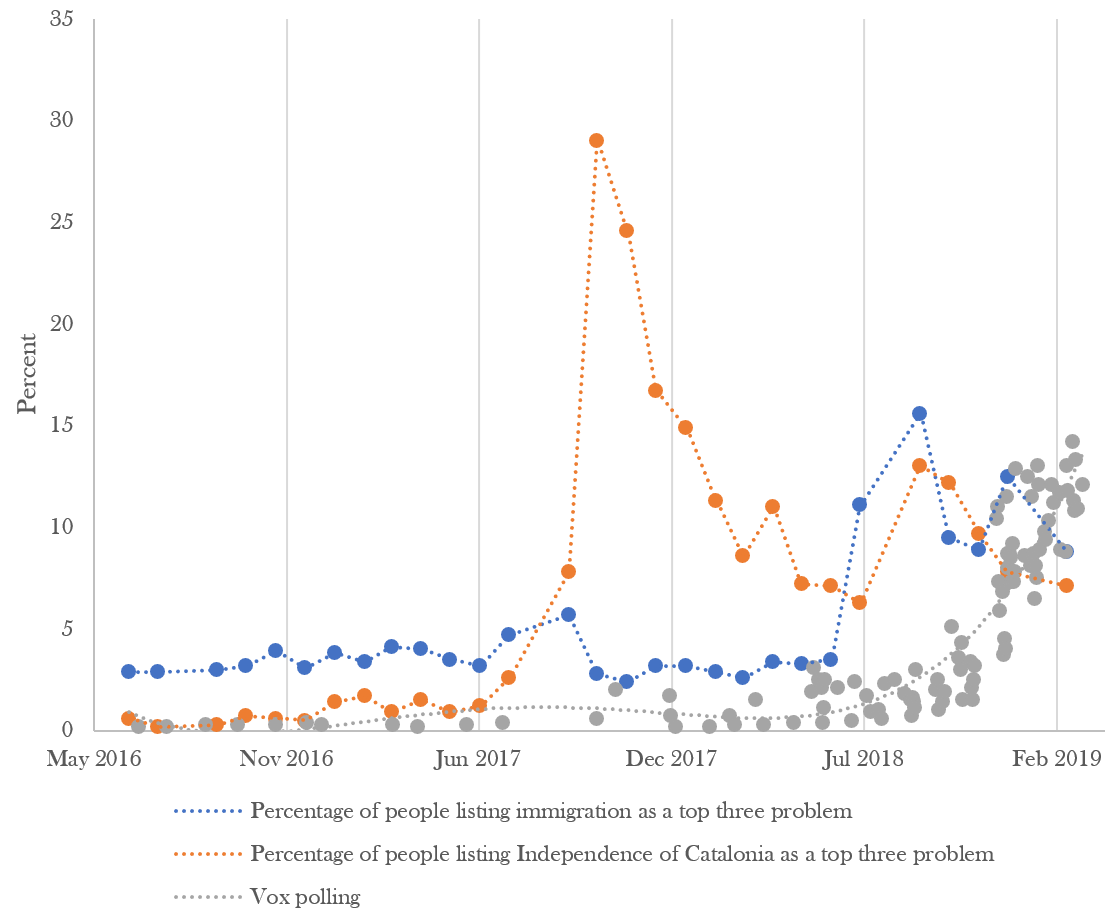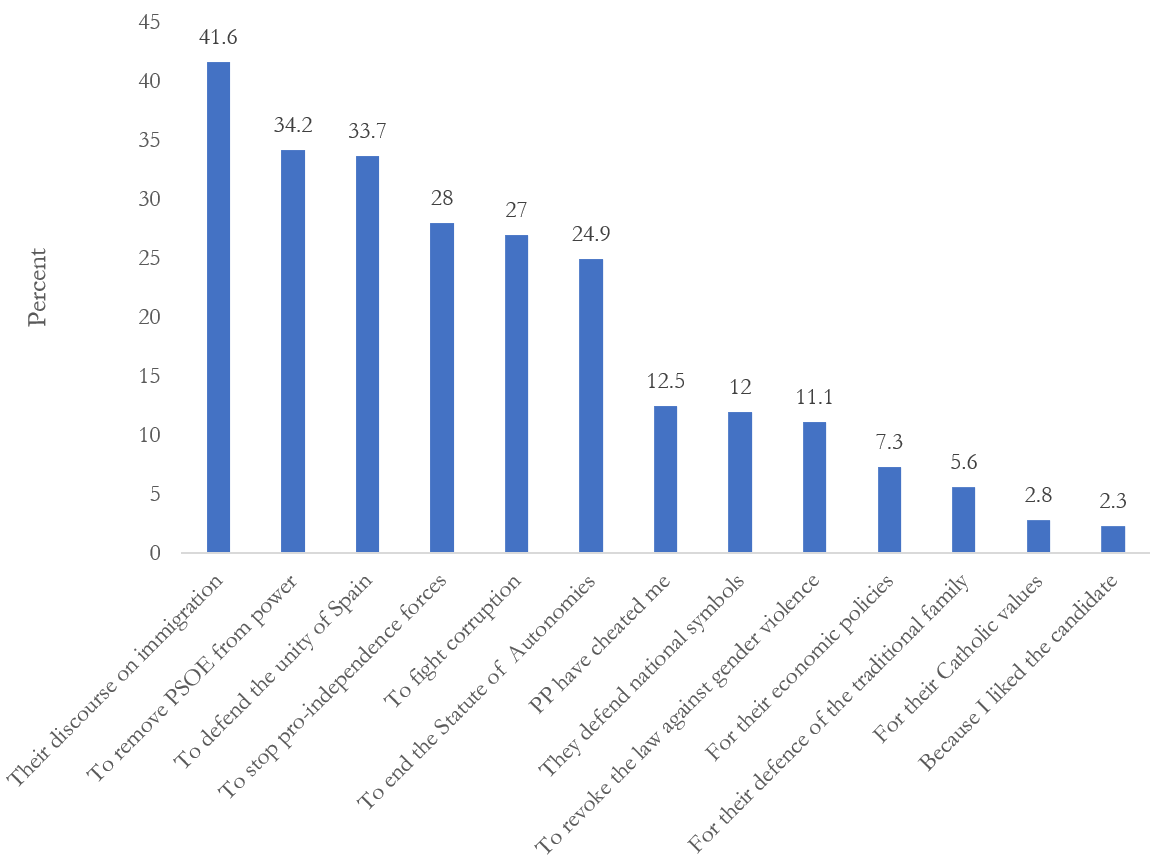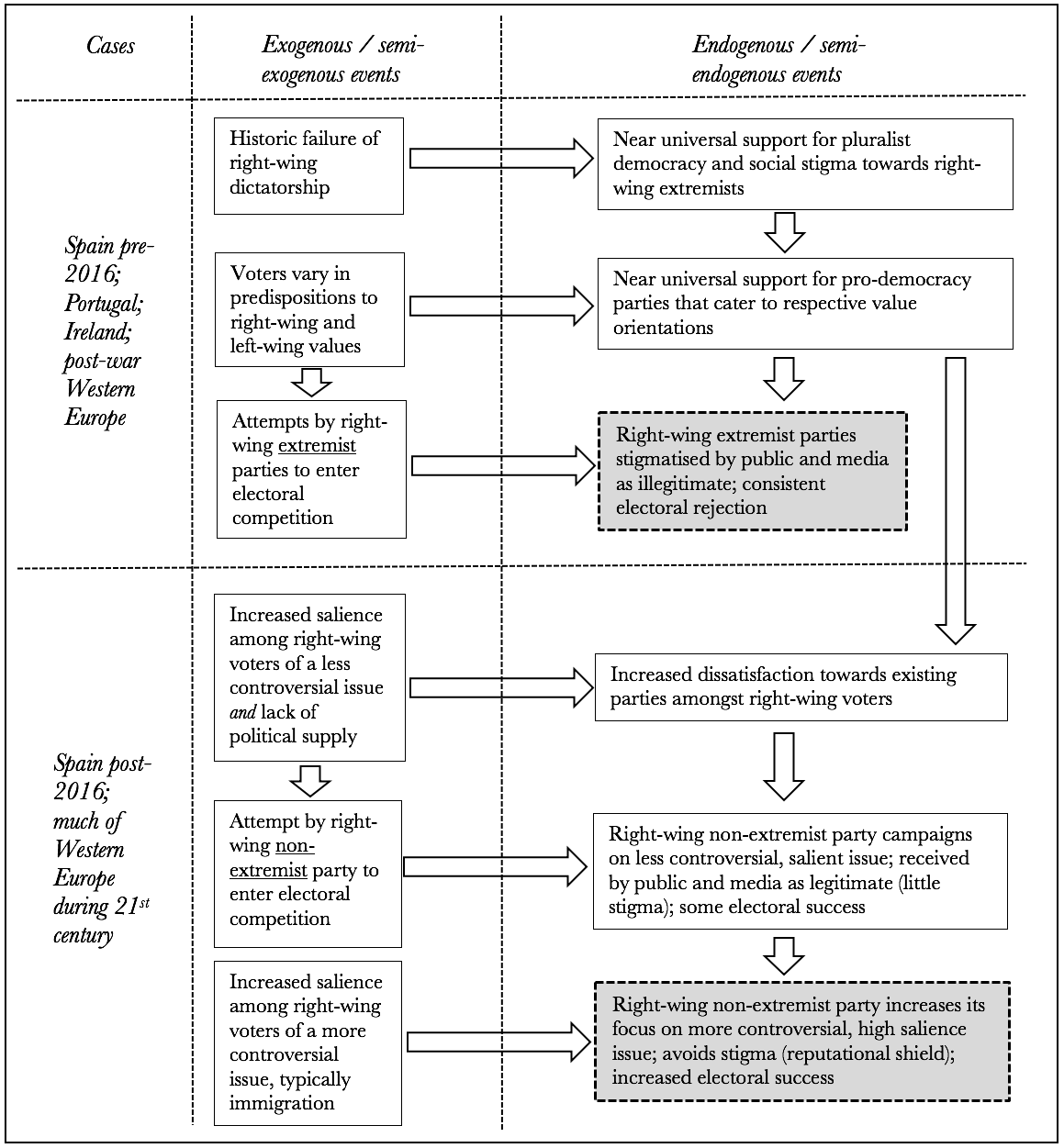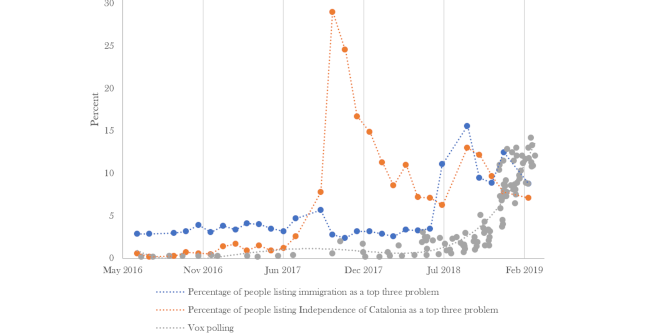
 One of the key stories in the leadup to the 2019 Spanish general election this weekend has been the emergence of the radical right party Vox. James Dennison and Mariana Mendes explain that the rise in support for Vox – in a country which until now had largely ignored the appeal of radical right parties – illustrates the conditions under which such parties can succeed.
One of the key stories in the leadup to the 2019 Spanish general election this weekend has been the emergence of the radical right party Vox. James Dennison and Mariana Mendes explain that the rise in support for Vox – in a country which until now had largely ignored the appeal of radical right parties – illustrates the conditions under which such parties can succeed.
One of the most notable phenomena in European politics in the last year has been the emergence and sudden increase in popularity of Vox – a Spanish populist radical right party that won 11% of the popular vote in the Andalusian regional elections last December and looks set to perform a similar feat in this week’s general election. Not only is the party’s emergence remarkable because of its rapidity but also because it has ended the long-standing lack of popular radical right success in Spain that, by 2018, had made the country nearly anomalous in western Europe.
Vox’s abrupt entry into the Spanish party system, its seemingly archetypical populist radical right nature and the ongoing lack of such a phenomenon in neighbouring Portugal, all make the case ideal for understanding under what conditions populist radical right parties succeed – a topic we have investigated in a new working paper. To do so, we build on previous academic work to offer a new theoretical model that explains populist radical right success as the result of ‘salience, stigma and supply’.
Prior to the rise of Vox, academics had already begun to note the close relationship between the salience of immigration – the proportion of the electorate that see the issue as one of the most important affecting their country – and the polling performances of the populist radical right across western Europe. Indeed, as shown in Figure 1, the recent uptick in Vox’s polling performances has been accompanied by a contemporaneous uptick in the salience of immigration amongst Spaniards. As also shown in Figure 1, the salience of immigration was lower in Spain and Portugal than anywhere else in western Europe over the seven years prior to 2018, with the exception of Ireland, the only other country to have no successful populist radical right party.
Figure 1: Percentage listing immigration as one of the top two issues affecting their country
Note: Data from Eurobarometer survey, May 2005-November 2018. Approximately 1000 face-to-face respondents per country per survey. Close-ended responses to ‘What do you think are the two most important issues affecting our country at the moment?’
However, given the high salience of immigration in Spain prior to 2010 – and particularly during the 2006 Cayucos boat crisis – we conclude that a non-negligible salience of immigration is a necessary but not sufficient condition for the success of the populist radical right. The causes of variation in the salience of immigration are discussed further in our working paper and elsewhere, though one factor in Spain has seemingly been the level of irregular immigration, as shown in Figure 2.
Figure 2: Number of irregular arrivals (reaching Spain via coast) and levels of concern over immigration in Spain
Note: Salience measures taken from monthly Centro de Investigaciones Sociológicas barometer’s question ‘What is, in your opinion, the most important problem in Spain today? And the second? And the third?’; Irregular arrivals statistics taken from the Spanish Ministry of the Interior.
We then turn to previous work that argues that populist radical right parties must be able to, at least initially, mobilise voters on another – usually nationally-specific – issue in addition to immigration. This allows them to enter the party system without the stigma of extremism and gain resources and popularity. These additional issues must resonate with right-wing voters but be, compared to immigration, less historically associated with right-wing anti-democratic extremism, which is widely rejected in society.
Such issues have historically included: Euroscepticism in the UK; tax in Norway and Denmark; agrarian interests in Switzerland and Finland; regional empowerment in Flanders and northern Italy; and anti-euro membership in Germany. We argue that, in Spain, the obvious analogous issue is unionism and opposition to Catalan independence. Like immigration, the extent to which such issues can facilitate the success of the populist radical right depends on, and can be measured by, their salience, as shown in Figure 3.
Figure 3: Issue salience of immigration and Catalan independence and polling for Vox
Note: Salience measures taken from monthly Centro de Investigaciones Sociológicas barometer’s question ‘What is, in your opinion, the most important problem in Spain today? And the second? And the third?’ Polling taken from Wikipedia’s aggregation of all polling for the 2019 Spanish elections. May 2016-March 2019.
Individual-level data confirm that the increased salience of immigration and Catalan independence has indeed motivated electoral support for Vox. Post-electoral surveys following the Andalusian regional elections confirmed that Vox’s rhetoric on immigration was the most common motivation for supporting the party, with ‘defence of the unity of Spain’, ‘stopping pro-independence forces’ and ‘ending the Statute of Autonomies’ making up three of the following five reasons, all of which can be interpreted as general support for a unified, centralised Spanish state. The second most stated reason was anti-incumbency voting, the fifth anti-corruption and the rest primarily social conservatism and opposition to the People’s Party’s ambiguity on these issues.
Figure 4: Stated motivations of Vox voters in the 2018 Andalusian elections
Note: Taken from 1,514 internet interviews amongst Vox voters in Andalusia between the 4-5 December, 2018 for El País, 8 December 2018.
However, Vox’s ability to win the support of right-wing voters has not happened in a vacuum but rather reflects the widespread perception that the conservative government did not have a firm enough hand in handling the separatist challenge. Vox, which demands nothing less than the overall suppression of regional autonomies and the re-centralisation of the Spanish state, has benefited from the ongoing fragile state of the mainstream right (the People’s Party), unceremoniously dumped from government in June 2018 following a successful vote of no confidence resulting from corruption charges.
Right-wing voters, who were most likely to see immigration and Catalan independence as important issues, therefore had strong reasons to not support the PP and, instead, search for a right-wing alternative, giving Vox a favourable political supply to work in. Furthermore, Vox’s founding by PP malcontents gave the party an additional form of ‘reputational shield’ that allowed it to avoid the stigma of extremism. As has been shown elsewhere, avoiding such a social stigma allows radical right parties to gain greater resources and removes an obstacle to potential positive socialisation effects, such as via political discussion, on voting for the party. We show in media analyses that Vox received far less negative news coverage than other radical right parties in Portugal and Spain over the last 15 years.
Figure 5: Theoretical framework: Under what conditions do populist radical right parties succeed?
Note: For more information, see the authors’ accompanying working paper.
Overall, our findings largely support the theoretical framework in our working paper. This framework – salience, stigma and supply – is shown in Figure 5 and explains both cross-country and cross-time variation in support for radical right parties. Though we show two outcomes – one in which the radical right party is widely rejected and one in which it gains popularity – there is of course a further outcome that our framework offers. Amongst other variables, if the salience of immigration falls in the future then it is highly likely that the electoral success of populist radical right parties will simultaneously fall. Indeed, this has already happened in a number of other European countries since the 2015 ‘migration crisis’ peak.
Please read our comments policy before commenting.
Note: This article gives the views of the authors, not the position of EUROPP – European Politics and Policy or the London School of Economics.
_________________________________
 James Dennison – European University Institute
James Dennison – European University Institute
James Dennison is a Research Fellow at the European University Institute in Florence. He has published in a number of academic journals and is the author of The Greens in British Politics (Palgrave, 2016). He tweets @JamesRDennison
 Mariana Mendes – European University Institute
Mariana Mendes – European University Institute
Mariana Mendes is a Doctoral Researcher at the European University Institute in Florence. She tweets @MarianaSeMendes



